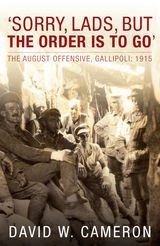 The line of publications on the subject of Gallipoli grows ever longer, but occasionally something fresh turns up. This book, where all the action occurs in a five-day period, reads more like a fast-paced fictional thriller than an historical account. The author has achieved this in three ways: he delivers a contiguous, multi-layered narrative by sewing together every available detail (Turkish as well as Allied); the use of diaries, reports and letters allow him to ‘get inside the head of his characters’ giving us the immediacy of direct speech and firsthand experience and interpretation; and finally, by constantly bombarding the reader’s five senses, he makes the experience as real and vicariously uncomfortable as possible.
The line of publications on the subject of Gallipoli grows ever longer, but occasionally something fresh turns up. This book, where all the action occurs in a five-day period, reads more like a fast-paced fictional thriller than an historical account. The author has achieved this in three ways: he delivers a contiguous, multi-layered narrative by sewing together every available detail (Turkish as well as Allied); the use of diaries, reports and letters allow him to ‘get inside the head of his characters’ giving us the immediacy of direct speech and firsthand experience and interpretation; and finally, by constantly bombarding the reader’s five senses, he makes the experience as real and vicariously uncomfortable as possible.
The book is packed with tense minute-by-minute accounts as in chapter 8 where the Australians oust the Turks from the Lone Pine trenches. We are given nine concurrent ‘scenes’ and three progressive maps showing the rapidly changing situation in the trenches. The action is dense, cacophonous, breathless and volatile and the body count on both sides ticks over rapidly. At the end of the chapter Cameron points out to mutual surprise: ‘Those who had time to look at their watches…must have been shocked to realise that less than 30 minutes had passed since they “hopped the bags”’. And this was just one of many battles on the whole peninsular.
The reader is constantly confronted with the surrounding putrid and acrid smells, the incessant roar and scream of men and artillery, the agony of the men in their thirst and intense nervous exhaustion, and of course the incessant visual parade of flame, gore and dust. It is noteworthy that some of the diarists and letter writers find poetic words to describe the clearness of a midday sky or the beauty of a sunset that is providing the backdrop to a silhouetted charge across no man’s land or another killing field, as if they are making the attempt to disconnect from the savagery around them.
The individual personalities of the diarists and commanders on both sides come out in the text, but there’s no use getting attached to any of them as no sooner do you ‘invest’ in a character, than he is blown away before your very eyes, emphasising that there was little continuity and no safe place on the peninsular (‘I lay down and he said, ”We are fairly safe here.” And a shot came past me and killed him instantly.’) The only time this reader felt let off the tenterhooks was when a quote commenced in the past tense, as in ‘Lieutenant Hanson later recalled…’
The first half of the book is easier reading in that, despite monstrous casualties and seven types of handicaps, progress was made as objectives were achieved wholey or in part. One of the most thrilling moments comes as the Maori troops storm up the heights chanting the haka and a diarist notes they all took up the cry such that it echoed from every ridge. The Turks fled their trenches in terror. As Cameron notes, ‘if only for a few minutes all seemed possible.’
The second half however, tells how positions were lost due to lack of backup (reinforcements waylaid and lost in the confusing terrain, and there was never an adequate supply of bombs) and how this lost the positions and increased casualties and broke the spirit of the commanders – ‘[I had to] tell them to go back and fight with bayonet and rifle until they were dead.’ And then followed the final coup de grâce when Malone’s New Zealanders, barely holding on to Chunuk Bair (which they attained against all odds and at great cost), were shelled off the ridge by the British navy.
For all the rich detail gathered in this book, Cameron also makes you aware of all the countless lost or unrecorded stories where he will describe, for example, three men racing over no man’s land who jump into a Turkish trench and poignantly note that they were never seen or heard from again.
The tension and sadness I experienced reading this book was very similar to that of watching Valkyrie at the cinema. Of course you know how it ends, but something in you subconsciously hopes for a last minute change. Just this once.

Comments
Total Comments : ( ) You have to register to post a comment.
RECENT COMMENTS